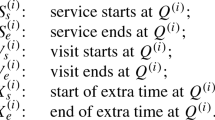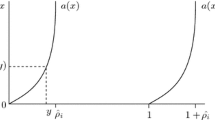Abstract
Consider a polling system withK≥1 queues and a single server that visits the queues in a cyclic order. The polling discipline in each queue is of general gated-type or exhaustive-type. We assume that in each queue the arrival times form a Poisson process, and that the service times, the walking times, as well as the set-up times form sequences of independent and identically distributed random variables. For such a system, we provide a sufficient condition under which the vector of queue lengths is stable. We treat several criteria for stability: the ergodicity of the process, the geometric ergodicity, and the geometric rate of convergence of the first moment. The ergodicity implies the weak convergence of station times, intervisit times and cycle times. Next, we show that the queue lengths, station times, intervisit times and cycle times are stochastically increasing in arrival rates, in service times, in walking times and in setup times. The stability conditions and the stochastic monotonicity results are extended to the polling systems with additional customer routing between the queues, as well as bulk and correlated arrivals. Finally, we prove that the mean cycle time, the mean intervisit time and the mean station times are invariant under general service disciplines and general stationary arrival and service processes.
Similar content being viewed by others
References
E. Arjas and T. Lehtonen, Approximating many queues by means of single server queues, Math. Oper. Res. 3(1978)205–223.
S. Asmussen,Applied Probability and Queues (Wiley, 1987).
P. Billingsley,Convergence of Probability Measures (Wiley, 1968).
F. Baccelli and P. Brémaud,Palm Probabilities and Stationary Queues, Lecture Notes in Statistics (Springer, 1980).
O.J. Boxma, Workloads and waiting times in single-server systems with multiple customer classes, Queueing Systems 5(1989)185–214.
O.J. Boxma and W.P. Groenendijk, Pseudo-conservation laws in cyclic-service systems, J. Appl. Prob. 24(1987)949–964.
O.J. Boxma, H. Levy and U. Yechiali, Cyclic reservation schemes for efficient operation of multiplequeue single-server systems, Ann. Oper. Res. 35(1992)187–208.
G.L. Choudhury and H. Takagi, Comments on “Exact results for nonsymmetric token ring systems”, IEEE Trans. Commun. COM-38(1990)1125–1127.
C.F. Daganzo, Some properties of polling systems, Queueing Systems 6(1990)137–154.
M. Eisenberg, Queues with periodic service and changeover time, Oper. Res. 20(1972)440–451.
L. Georgiadis and W. Szpankowski, Stability of token passing rings, Queueing Systems 11(1991), this issue.
S. Grigorescu and G. Oprişan, Limit theorems for J-X processes with general state space, Z. Wahrscheinlichkeitstheorie verw. Gebiete 35(1976)65–73.
A. Jean-Marie and Z. Liu, Stochastic orderings on partial sums of random variables and on counting measures of random intervals, INRIA Research Report No. 1422 (April, 1991), Adv. Appl. Prob., to appear.
P. Kuehn, Multiqueue systems with nonexhaustive cyclic service, Bell. Syst. Tech. J. 58(1979) 671–698.
H. Levy, Analysis of binomial-gated serice,Proc. Performance of Distributed and Parallel Systems, ed. T. Hasegawa, H. Takagi and Y. Takahashi (North-Holland, 1989), pp. 127–139.
H. Levy, M. Sidi and O.J. Boxma, Dominance relations in polling systems, Queueing Systems 6(1990)155–172.
M. Miyazawa, The derivation of invariance relations in complex queueing systems with stationary inputs, Adv. Appl. Prob. 22(1983)874–885.
G.I. O'Brien, Limit theorems for sums of chain-dependent processes, J. Appl. Prob. 11(1974)582–587.
N.N. Popov, Conditions for geometric ergodicity of countable Markov chains, Sov. Math. Dokl. 18(1977)676–679.
L.D. Servi, Average delay approximation of theM/G/1 cyclic service queues, IEEE Trans. Sel. Areas Commun. SAC-4(1986)813–822. Correction in SAC-5(1987)547.
M. Sidi, H. Levy and S.W. Fuhrmann, A queueing network with a single cyclically roving server, Queueing Systems 11(1992), this issue.
F.M. Spieksma, Geometrically ergodic Markov chains and the optimal control of queue, Ph.D. Thesis, University of Leiden.
V. Strassen, The existence of probability measures with given marginals, Ann. Math. Statist. 36(1965) 423–439.
H. Takagi,Analysis of Polling Systems (MIT Press, 1986).
H. Takagi, Queueing analysis of polling models: An update, in:Stochastic Analysis of Computer and Communications Systems, ed. H. Takagi (Elsevier, 1990), pp. 267–318.
Tedijanto, Exact results for the cyclic service queue with a Bernoulli schedule, Report, SRC, University of Maryland (1988).
A.F. Veinott, Jr., Optimal policy in a dynamic, single product, nonstationary inventory model with several demand classes, Oper. Res. 13(1965)761–778.
V.S. Zhdanov and E.A. Saksonov, Conditions of existence of steady-state modes in cyclic queueing systems, Autom. Remote Control 40(1979)176–184.
Author information
Authors and Affiliations
Rights and permissions
About this article
Cite this article
Altman, E., Konstantopoulos, P. & Liu, Z. Stability, monotonicity and invariant quantities in general polling systems. Queueing Syst 11, 35–57 (1992). https://doi.org/10.1007/BF01159286
Issue Date:
DOI: https://doi.org/10.1007/BF01159286




